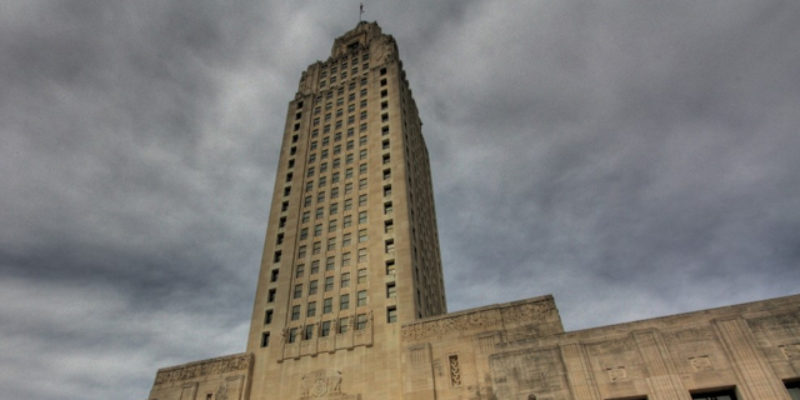The myriad of political and policy changes afoot in the State Capitol have dominated many a headline over the last year or so. We have a Louisiana economy in recession, a state budget seemingly in constant deficit, a host of previously passed reforms under reconsideration and an increasingly chaotic political landscape. Negative consequences of every possible scenario are well documented in excruciating detail, although real analysis on consensus-driven plans to reform the system is much harder to come by. While fiscal analysts remain unsure of the actual amount of taxes raised just last month, there is already a growing drumbeat for more taxes this summer.
Proverbial fire alarms are being pulled throughout the Capitol though sensible plans to extinguish the blaze are rare. Cages are being rattled and stakeholders are being provoked to keep the feeding frenzy in place. All the while, many Louisiana residents are becoming either irritated to the point of rage or disillusioned to the point of apathy.
Sometimes you just have to step back and sort through a few basic questions and consider all of the proposed answers.
The rhetoric and political theater of the day has masked the same fundamental questions with which Louisiana has long struggled to answer. Rather, it appears we are resigned to follow the advice of author John Henry Reese, who said, “Don’t ask questions that you don’t want the answer to.” Though some may prefer avoidance, the questions are not going away.
How do we end the cycle of poverty in Louisiana?
Historically, Louisiana has struggled to overcome poverty and its impact on households, communities and the state as a whole. Too many kids are growing up in troubled neighborhoods and regions with too few opportunities, leading to a vicious cycle that has proven detrimental to all citizens’ quality of life, the state’s economy, health outcomes, incarceration rates, community development and even the state budget. Some now argue the primary way to address this serious issue is to increase dependence on traditional government programs, return students to the schools they chose to leave and require a host of new mandates on employers. Others believe the better approach is to continue to push forward with bipartisan innovations in our schools, rethink traditional government programs to shift the focus to workforce development, embrace sensible smart-on-crime policies and prioritize markets over mandates to improve economic opportunities for all.
How do we responsibly address the state budget deficit?
Louisiana has periodically faced budget shortfalls since the oil crash of the early ‘80s and will continue to do so until the state undertakes a comprehensive approach to reform the entire budget structure. Some now argue it is unrealistic to focus on government cuts, efficiencies, and reforms and that new taxes are the only viable path forward. On the other hand, some are urging a long overdue comprehensive and sustainable approach that also includes un-dedicating large areas of the state’s budget, eliminating red tape and unnecessary bureaucracy, consolidating duplicative boards and commissions, reshaping outdated and expensive programs, scrutinizing all spending by governmental agencies and reducing the over-reliance of local government on state taxpayers.
How do we protect and improve higher education in Louisiana?
Across the country, systems of higher education are in transition in regard to governance, delivery models, financing, size and relevance to workforce needs. Considering the fact that workforce development is a major challenge that must be met to grow Louisiana’s economy, improvement in the quality and relevance of the higher education product and a cooperative spirit to meet these important goals are paramount. While sustainable and predictable funding for higher education is clearly important, increased funding is by no means a panacea for higher education. Relevant performance requirements implemented with fidelity, financial autonomy for deserving institutions, the seamless articulation between campuses, prioritization of resources on programs that will fill high-demand, high-wage jobs, and the elimination of underutilized and duplicative bureaucracies and programs are just as critical for students, their families and the state.
Who is to blame for our challenges?
The Legislature – present or past? Gov. Edwards? Gov. Jindal? Govs. Blanco, Foster, or Edwin Edwards? The legacy of Huey Long? Special interests? The media? The correct answer is “Who cares?” The never-ending finger-pointing and search for a “boogeyman” has played out in Louisiana for decades and has always been more about politics than policy. Our challenges run deep, they are not new and they are not the product of one creator. The reality is we are all that boogeyman. Louisiana has too often laughed off the shenanigans of the past and looked the other way as our state accumulated one self-inflicted wound after another. Everyone has contributed to this moment; we did not get here overnight and we will not dig out in that brief time either. But dig out, we must.
This list of questions facing Louisiana is neither exhaustive nor new. The issues will not change until we start offering and demanding fundamentally different answers to these perennial questions.
William Shakespeare said, “There are two sides to every question, because, when there are no longer two sides it ceases to be a question.”
One day, these may, in fact, cease being Louisiana’s questions if we eventually start giving fundamentally different answers. That day can come, but if current discourse continues, it may not be anytime soon.
Advertisement
Advertisement

